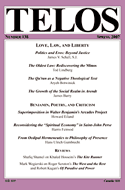As an occasional feature on TELOSscope, we highlight a past Telos article whose critical insights continue to illuminate our thinking and challenge our assumptions. Today, Michael Bacal looks at Howard Eiland’s “Superimposition in Walter Benjamin’s Arcades Projects,” from Telos 138 (Spring 2007).
 Walter Benjamin’s Arcades Project is likely the most jarring and ambitious work of cultural history of the twentieth century. Breathtaking in its scope, brilliant in its insight, and stamped throughout with his inimitable style, it is the unfinished, thirteen-year project Benjamin attempted as an encyclopedic capture of the emergence of Paris as the capital of the nineteenth century. Touching on everything from urban development to literary analysis and revolutionary consciousness, it presents a vast palimpsest of quotations, theoretical reflections, and minutiae taken from the most quotidian aspects of Parisian life. In a recent Telos article, Howard Eiland, one of the translators responsible for bringing the Passagenwerk into English, offers a compelling overview of Benjamin’s text and a stable set of theoretical coordinates with which to navigate it. His essay, “Superimposition in Walter Benjamin’s Arcades Project,” does this by putting forth the figure of the flâneur as the organizing locus of the book and by developing his unique experience of the world as central not only to the text but also to Benjamin’s theoretical project as a whole. By elaborating this through the notion of “superimposition,” Eiland outlines the singular experience of the flâneur and connects it with the broader historical and political dimensions to which it opens.
Walter Benjamin’s Arcades Project is likely the most jarring and ambitious work of cultural history of the twentieth century. Breathtaking in its scope, brilliant in its insight, and stamped throughout with his inimitable style, it is the unfinished, thirteen-year project Benjamin attempted as an encyclopedic capture of the emergence of Paris as the capital of the nineteenth century. Touching on everything from urban development to literary analysis and revolutionary consciousness, it presents a vast palimpsest of quotations, theoretical reflections, and minutiae taken from the most quotidian aspects of Parisian life. In a recent Telos article, Howard Eiland, one of the translators responsible for bringing the Passagenwerk into English, offers a compelling overview of Benjamin’s text and a stable set of theoretical coordinates with which to navigate it. His essay, “Superimposition in Walter Benjamin’s Arcades Project,” does this by putting forth the figure of the flâneur as the organizing locus of the book and by developing his unique experience of the world as central not only to the text but also to Benjamin’s theoretical project as a whole. By elaborating this through the notion of “superimposition,” Eiland outlines the singular experience of the flâneur and connects it with the broader historical and political dimensions to which it opens.







